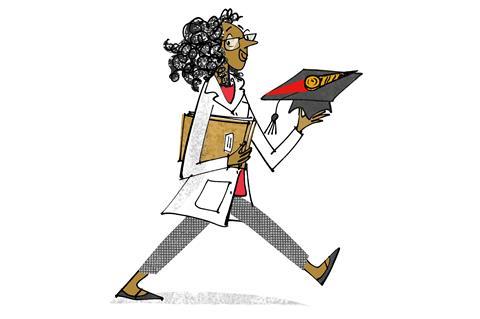Three activities that helped me to thrive in academia and beyond

I am an accredited material scientist with a strong polymer chemistry background, an introvert-turned-ambivert, a person who can confidently uproot themselves and build a life somewhere new (which has its unique set of hurdles as a young woman who is a British-born Ghanaian and a Londoner). My merits, and the uncovering of my weaknesses, came to be because I said ‘yes’ to pursuing an academic career path.
Developing and refining the technical and soft skills I now possess was gruelling at the time, but ultimately, became rewarding. As I look back on my nine years as a PhD and postdoctoral researcher, I want to share three activities that helped me to thrive. I believe there are aspects to these activities that are both niche – depending on one’s lived experience – and common. Regarding the aspects that are common, I encourage early-career researchers to think about what is within their control and become motivated to make the most of their experience holistically.
Teamwork with your supervisor
Your professional relationship with your supervisor is an opportunity for you to learn about them and discover for yourself the effective ways of working as a team. I have observed from my interactions with a diversity of supportive supervisors that their communication and working pattern largely reflects what works best for them. It has also been in my best interests to question what ways this impacts me and my work so that, while playing our respective roles, we can achieve our shared goal. For example, my-incredibly-busy supervisor and I benefitted from my proactiveness in arranging prospective meetings, and I produced better-quality research as I learnt to be thorough when engaging with my acutely-aware supervisor.
I have also seen that a supervisor can have well-meaning intentions to support me, but can lack the cognitive tools to deliver their support because of nuances in our personalities and ignorance about the differences in our lived experiences. I was comfortable playing a role in creating a safe and on-going conversation with my supervisor, and this brought about a mutual understanding that their indirect support would be helpful for me. I am aware that not everyone will be in a position to achieve this. This is one of many situations where being a part of diverse communities can bring advantages.
Building community
The saying ‘no man is an island’ alludes to the empowering force community possesses. I recognise that immersing myself in both formal and non-formal communities has catered to my interpersonal needs professionally, non-professionally or both simultaneously. In all contexts, I am reminded that people are all-encompassing; a hodgepodge of strengths, weaknesses, idiosyncrasies and personality traits (that we like or that rub us up the wrong way – a bit like eating marmite). Accepting this about ourselves and others helps us to navigate how we can relate to one another fruitfully.
I have learnt that there are colleagues who are better suited to support my technical needs than my emotional wellbeing, and some where our professional relationship organically grows into friendship. I have also learnt that it is important for me to find community among those who respect and understand deeply the intersectionality of my existence and how that plays a role in my experience of navigating academia.
So, who are the people you are surrounded by and how can they best support you (and how can you best support them)? Consider this your encouraging nudge to explore how to immerse yourself in an existing community, or to take the plunge to create one by identifying those who share common interests with you. A first step could be to find out how your university can support the inception of this group.
Thinking ahead
On reflection, the most important skills I have developed include my ability to identify and embrace my role in fostering a symbiotic working relationship with a supervisor, and to immerse myself in a community that builds upon my own and other people’s strengths.
Currently, I am exploring a career outside of academia. Before reaching this decision, I attended a workshop organised by a university that encouraged me to adopt a forward-thinking mindset; to consider the transferable nature of the skillsets I have acquired and to be specific in choosing the skills I want to develop for particular roles. It was helpful keeping a list of all my technical and soft skills so that I could build upon it when sprucing up my CV. It was also a useful conversation starter for when I approached senior academics for career advice.
I am enthusiastic that the next opportunity I say ‘yes’ to will reveal how my current skills take shape in a new working environment, in tandem with developing new ones.












No comments yet